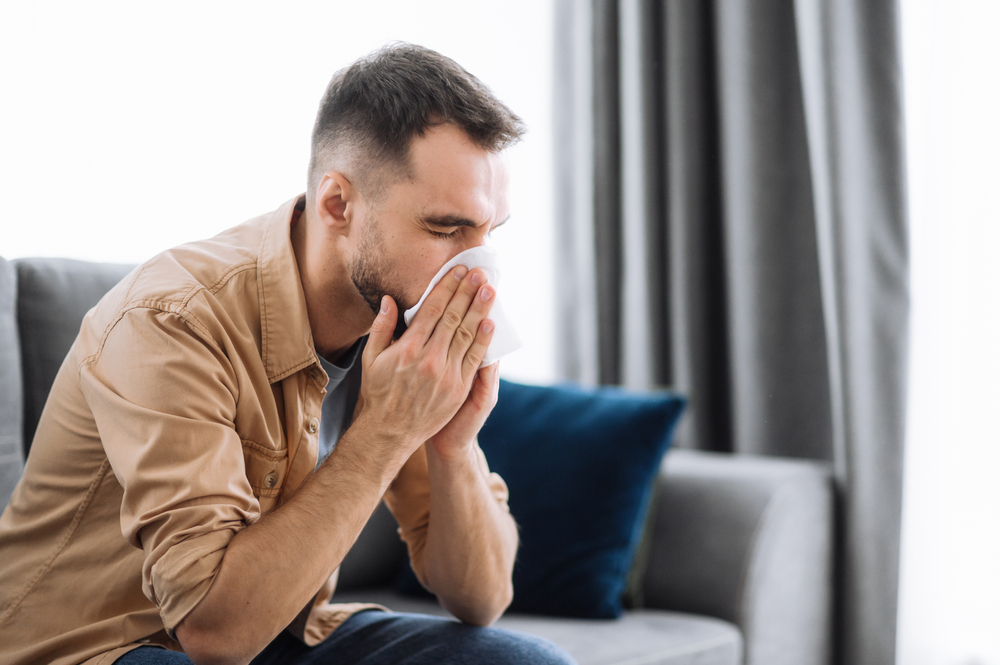What are the Treatment Guidelines for Allergic Rhinitis?

Allergic rhinitis, or hay fever, manifests similar signs and symptoms to the common cold. Symptoms might include a stuffy nose, watery eyes, sneezing, and pressure in the sinuses. However, unlike the common cold, there is no viral aetiology for hay fever. One might have hay fever when their immune system overreacts to a normally innocuous outdoor or indoor chemical (allergen).Pollen and dust mites are examples of common allergens that may bring on a case of hay fever. Small pieces of skin (pet dander) shed by cats, dogs, and other animals with hair or feathers may also cause allergic reactions.
Having hay fever is never fun, but it may also hinder your productivity at work or school and cause other problems. You don't have to put up with bothersome symptoms any longer. The correct therapy may be found, and you can learn to avoid triggers.
Exactly What is Hay Fever (Allergic Rhinitis)?
Itchy, watery eyes and a runny nose are symptoms of allergic rhinitis, sometimes known as hay fever. Histamine is a naturally occurring substance released in response to allergens entering the body through the respiratory system (nose or mouth). Hay fever is brought on by various allergens, both outside and inside. Dust mites, mold, pet dander, and pollen from trees and plants are typical triggers.
Hay fever causes sneezing, stuffy nose, and irritation of the eyes, throat, and mouth. The common cold and its infectious counterpart, rhinitis, are not the same as allergic rhinitis. You cannot spread hay fever to others. When your immune system overreacts to anything in the air, you end up with allergic rhinitis. The allergens (irritants) are so small that they may enter the body via the respiratory system (nose and mouth).
In most individuals, allergens pose little danger. However, your immune system may incorrectly identify the allergen as a threat if you suffer from hay fever. Your immune system deploys protective substances into your circulation as a defense measure. The primary component is an antigen called histamine. To rid themselves of the allergen, the mucous membranes in the nasal passages, eyelids, and throat become irritated and irritating.
A wide variety of allergens may trigger seasonal and year-round reactions.
- Dust mites are tiny bugs in upholstered goods, carpets, and rugs.
- Tree, grass, and weed pollen.
- Pollen from pets (tiny flakes of dead skin).
- Contamination by mold spores.
- Cockroaches, including their waste products and saliva.
- Nasal and pharyngeal irritation is another possible outcome of food allergy. Get medical attention immediately if you fear you're experiencing an allergic reaction to anything you ate. Having a severe allergy to food may be quite dangerous. Indicators of an allergic reaction in the nose
Allergic Rhinitis Symptoms
Here are a few allergic rhinitis symptoms:
- Sneezing
- Nasal congestion
- Coughing
- Throat irritation, Itch, or Pain
- Dry eyes
- The presence of shadows around the eyes
- Continual head pain
- Skin that is exceedingly dry, itchy, and prone to blistering and weeping (classic eczema symptoms)
- Hives
- A state of extreme exhaustion
In most cases, you'll start experiencing symptoms soon after coming into touch with an allergen. Long-term allergen exposure is associated with certain symptoms, such as chronic tiredness and headaches.
For some, rhinitis symptoms only appear sometimes. Exposure to allergens in high concentrations is likely to cause this. For others, symptoms persist throughout the year. If your symptoms have persisted for more than two weeks without improvement, you should see your doctor about the possibility of allergies.
How Do Medical Professionals Manage Hay Fever (Allergic Rhinitis) Symptoms?
Symptoms of hay fever may be reduced with the use of several allergy drugs.
- Antihistamines:
It is possible to get the best allergic rhinitis medicine, and antihistamines without a prescription or to buy them over the counter. They counteract the effects of an allergic reaction by preventing histamine production. You may take antihistamines orally, topically, or even inhale them.
- Decongestants:
These drugs alleviate nasal and sinus congestion. You might use a nasal spray or take a tablet to alleviate congestion. An allergic response triggers the production of inflammatory substances like leukotriene and histamines, which may lead to symptoms like sneezing and watery eyes. These medications, which can only be obtained via a doctor's prescription, inhibit a chemical called leukotriene.
- Immunotherapy:
The medication is effective because it teaches the body to ignore allergies in the future. In a series of injections (allergy shots), your healthcare professional injects a very low dose of the allergen into your body. The allergen dose is increased with each subsequent injection. Your body will cease reacting to the allergen when your immune system has had a chance to get used to it. Your doctor may prescribe immunotherapyas a sublingual tablet for allergic rhinitis treatment.
Do Any Preventative Measures Exist for Hay Fever?
There is no rhinitis treatment to completely cure it but you may learn to live with it by modifying your lifestyle. The hay fever symptoms may be reduced by avoiding triggers as much as possible. To alleviate symptoms, try the following:
- Stay away from your face, and don't touch your eyes or nose.
- When pollen counts are highest in the spring, summer, and early autumn, it's best to keep windows closed at home and in the automobile.
- Use protective coverings for your bedding to prevent dust mites from settling in.
- Don't let your pet on the furniture; if you don't want them in your bedroom, make sure the door is closed.
- To minimize exposure to allergens, use the air filter in your central air system and the one in your vacuum cleaner.
- Always wash your hands after touching a pet, particularly after handling a dirty one.
Conclusion
You should consult a doctor about your hay fever symptoms even if you don't have any major complications. Medical attention should be sought if hay fever symptoms are preventing you from doing everyday tasks or causing sleep disruptions. Your doctor will be able to help you figure out what allergies are bothering you and give you advice on how to treat them.






